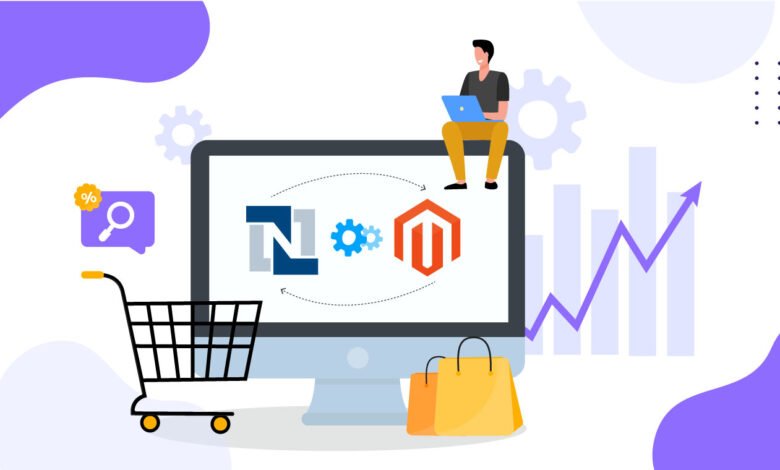From Spreadsheets to Smart Business: Why NetSuite is Quietly Powering the Future of E-Commerce

I’ve seen businesses go from running their entire operation on a chaotic mess of spreadsheets to full-blown automation that practically runs itself. The culprit? A little powerhouse called NetSuite. If you’re in the e-commerce world and haven’t seriously looked at NetSuite, you’re probably still duct-taping together inventory, sales, and customer data like it’s 1999. And let’s be honest, nobody wants to run a business like a relic from the past.
Right here in Charlotte, North Carolina, NetSuite is making waves for businesses that are tired of playing inventory Jenga and want a system that actually works. But before we dive into how NetSuite is changing the game, let’s talk about the real issue: why so many companies are still stuck using the digital equivalent of a filing cabinet.
The Spreadsheet Problem: Why Businesses Struggle to Keep Up
If I had a dollar for every business that told me, “We track everything in spreadsheets,” I’d be competing with Oracle’s stockholders. It’s the universal starting point for businesses—simple, cheap, and “just works” until it doesn’t. But here’s the reality: spreadsheets are fine until you hit a certain threshold.
One moment, you’re happily tracking sales, forecasting inventory, and keeping customers happy. The next, your Excel file takes five minutes to open, your formulas break every other day, and your sales team is one accidental “CTRL + A, DELETE” away from setting the company back a month. It’s not just small businesses either—massive companies have suffered data disasters from over-relying on spreadsheets.
This is where NetSuite development in Charlotte comes in. Businesses that outgrow spreadsheets often turn to ERP (Enterprise Resource Planning) solutions, and among them, NetSuite has carved out a reputation for being the Swiss Army knife of business management.
How NetSuite Paved the Way for Modern E-Commerce
Let’s get real: running an e-commerce store requires balancing inventory management, customer relationships, marketing, and keeping your site running smoothly. NetSuite has positioned itself as the all-in-one solution that seamlessly integrates these elements.
Above Bits, a powerhouse in NetSuite development in Charlotte has been integrating NetSuite solutions for companies that need to step up their game. From order automation to real-time inventory tracking, NetSuite does what Shopify, WooCommerce, and Magento often fail to do at scale—keep the backend from turning into a logistical nightmare.
Take Tesla as an example. The EV giant doesn’t run on guesswork; it relies on supply chain intelligence powered by ERPs, including NetSuite-like solutions. While Tesla isn’t using NetSuite specifically, its prioritization of ERP systems proves the importance of data-driven business operations. Meanwhile, smaller businesses in North Carolina are catching on, realizing that scalability is impossible without a unified system that manages everything from procurement to customer service.
The Secret Sauce: Why NetSuite Works So Well for E-Commerce
Here’s where things get interesting. NetSuite isn’t just an inventory tracker—it’s a full-blown automation hub that connects every aspect of an e-commerce business. If you sell anything online, you know that tracking sales, managing stock, and ensuring orders get shipped correctly is like conducting an orchestra with musicians who all speak different languages.
NetSuite’s trick is in automation. The system doesn’t just display sales figures; it predicts stock shortages before they happen, integrates with marketing platforms for better customer retention, and even helps businesses dodge the dreaded “out of stock” problem that has plagued retailers since the dawn of online shopping.
And then there’s the plugin ecosystem. With add-ons that enhance payment processing, CRM capabilities, and advanced analytics, businesses can tweak NetSuite into a system that matches their exact needs. Companies like Above Bits, specializing in NetSuite development in Charlotte, have been fine-tuning these integrations for years, ensuring that businesses aren’t stuck with a one-size-fits-all solution but a custom-built powerhouse.
Where NetSuite Fails (And Why It’s Still Worth It)
Now, let’s not pretend NetSuite is flawless. If you go on forums or talk to businesses implementing it, you’ll hear some common complaints. The first? Pricing. NetSuite isn’t cheap, and Oracle, its parent company, isn’t exactly famous for its generosity when it comes to licensing fees.
Another downside is the learning curve. Businesses switching from simple e-commerce platforms like Shopify often find NetSuite overwhelming at first. It’s not just a plug-and-play system; it requires setup, optimization, and ongoing adjustments to work at peak efficiency. That’s why companies often turn to experts like Above Bits, who have nearly two decades of experience making NetSuite work for businesses in Charlotte and beyond.
Despite these drawbacks, NetSuite remains a dominant force because—when done right—it’s the last ERP you’ll ever need. The efficiency gains far outweigh the initial headache of learning the system.
Why E-Commerce Giants Are Moving to NetSuite
When big companies move to an ERP, it clearly signals that something is shifting in the industry. NetSuite has been gaining traction among e-commerce giants that realized traditional platforms weren’t cutting it.
For instance, ASICS, the global sportswear brand, switched to NetSuite to unify its supply chain across multiple continents. Before that, their order system was fragmented across different regions, causing delays and stock discrepancies. After the switch, ASICS reduced errors, improved shipping times, and gained real-time global inventory insights.
Closer to home in Charlotte, businesses are realizing that their future growth hinges on having a system that doesn’t crumble under pressure. NetSuite development in Charlotte by Above Bits has been a go-to solution for e-commerce brands needing scalable, high-performance systems without breaking the bank.
This brings me to an important point—if you’re looking for a team that understands NetSuite and how to fine-tune it for maximum efficiency, the right expertise makes all the difference. Businesses that partner with seasoned developers get custom integrations that actually fit their workflow instead of forcing them into a rigid system.
How NetSuite Stacks Up Against the Competition
No ERP system exists in a vacuum. Businesses looking into NetSuite often compare it with SAP, Microsoft Dynamics, or even custom-built solutions. And let’s be honest—there’s a reason why debates over the “best” ERP are as heated as arguments about iOS vs. Android.
SAP, for example, dominates the enterprise space. Companies like Walmart and Coca-Cola use it to handle complex global supply chains and financial operations. But it comes with a hefty price tag and an even steeper learning curve. Microsoft Dynamics, on the other hand, appeals to businesses already invested in the Microsoft ecosystem, with seamless integration into Office 365 and Azure.
So, where does NetSuite shine? Scalability and flexibility. Unlike SAP, which often requires multimillion-dollar deployments, NetSuite offers a cloud-based, modular approach. That means businesses can start small and add features as they grow without getting locked into an all-or-nothing system. Unlike Microsoft Dynamics, NetSuite generally provides better multi-channel e-commerce support, so many online retailers choose it over Microsoft’s offering.
That’s precisely why businesses looking for NetSuite development in Charlotte partner with teams like Above Bits—they need professionals who can fine-tune the platform to match their specific needs, whether it’s custom order workflows, unique payment integrations, or specialized reporting.
The Future of ERP: How AI and Automation Are Changing Everything
Now, here’s where things get really interesting. The rise of AI-powered automation is changing how businesses approach ERP, and NetSuite is no exception. Oracle has been aggressively investing in AI-driven analytics and machine learning, focusing on predictive insights that help companies to stay ahead of supply chain issues, customer trends, and financial forecasting.
For example, NetSuite now offers AI-enhanced financial management tools that automatically detect accounting discrepancies, reducing fraud and improving accuracy. On the e-commerce side, AI-driven demand planning helps businesses avoid stockouts or overstocking by predicting consumer behavior based on historical trends and real-time data.
This shift toward automation is why companies that rely on NetSuite development in Charlotte work with experts who implement and optimize it with cutting-edge AI tools. Above Bits has been ahead of the curve in integrating AI-powered automation, ensuring businesses don’t just use NetSuite but get the most out of it.
The Dark Side of AI in ERP Systems
Of course, AI in ERP has its issues. Automation is only as good as the data it learns from, and if businesses feed NetSuite incomplete or inaccurate data, AI-generated insights can be wildly inaccurate. There’s also the challenge of workforce adaptation. Employees used to manual processes often struggle to trust AI-driven automation, leading to pushback in implementation.
And let’s not forget Oracle’s aggressive pricing model. While NetSuite is a game-changer, Oracle has been known to adjust licensing costs unpredictably. Businesses that don’t fully understand the licensing terms can face unexpected expenses. This is why working with an experienced team in NetSuite development in Charlotte, like Above Bits, is essential—navigating these complexities requires expertise.
Global ERP Trends: What’s Next for NetSuite?
Looking at global ERP trends, one thing is clear: cloud-based, AI-driven systems are the future. Businesses are moving away from on-premise ERPs in favor of solutions that offer real-time data access, seamless integrations, and predictive analytics.
Even traditional ERP-heavy industries like manufacturing and logistics are shifting toward cloud-based solutions. Tesla, for example, has been doubling down on AI-driven inventory management to streamline its production lines. Amazon has its own proprietary ERP, but many of its third-party sellers rely on NetSuite to manage inventory across Amazon, eBay, and their own e-commerce sites.
For e-commerce businesses in Charlotte and beyond, the question isn’t whether they need an ERP—it’s whether they’re ready to scale with one. The right ERP system can mean the difference between a business that barely keeps up and one that dominates its market.
Why NetSuite is Worth the Investment
The world of e-commerce isn’t slowing down, and businesses that fail to adapt are bound to get left behind. NetSuite isn’t a magic bullet, but when implemented correctly, it provides a level of automation, scalability, and intelligence that traditional e-commerce platforms simply can’t match.
At the end of the day, it’s about working smarter, not harder. Businesses that embrace NetSuite development in Charlotte with the right expertise—like the team at Above Bits—set themselves up for long-term success. With nearly two decades of experience, Above Bits has helped businesses integrate NetSuite in ways that maximize efficiency and minimize headaches.
If you’re looking to take your e-commerce operations to the next level, the right ERP partner makes all the difference. Learn more about NetSuite development in Charlotte by Above Bits and see how the proper implementation strategy can redefine your business operations.




